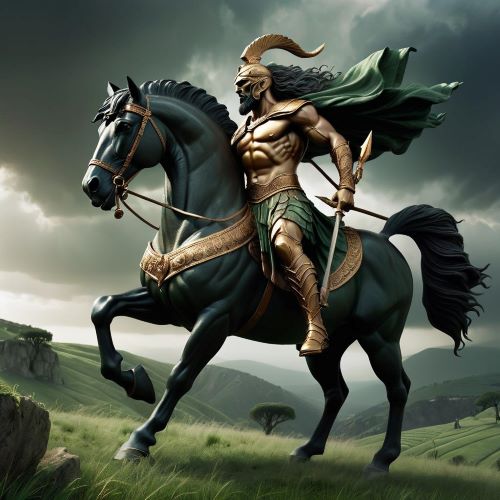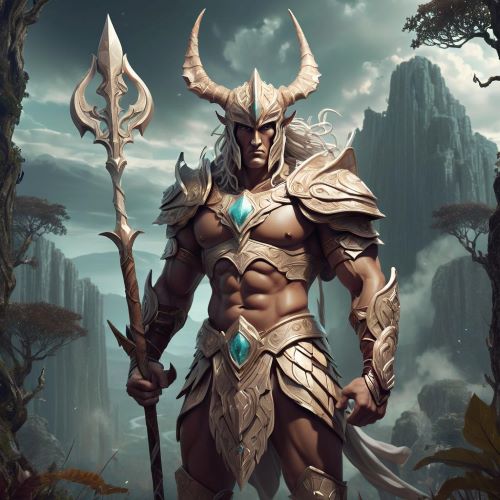Illyrian Gods
Illyrian gods form a fascinating aspect of ancient Illyrian mythology, reflecting the beliefs and cultural identity of the Illyrian people who once inhabited the western Balkans. Although much of the detailed knowledge about these deities has been lost to history, the surviving fragments reveal a rich tapestry of divine figures associated with various aspects of life, nature, and the cosmos. The Illyrian pantheon showcases a unique blend of indigenous traditions and influences from neighboring cultures, highlighting the complexity of their spiritual world. These gods were revered for their power over the elements, protection of communities, and guidance in times of need, demonstrating the Illyrians’ deep connection to their environment and the supernatural.
Among the prominent Illyrian gods is Dea Bendis, a goddess associated with the moon and hunting. Bendis embodies both femininity and strength, representing the dual aspects of nurturing and ferocity. Worshipped primarily in the context of nature and fertility, she was often invoked by those seeking success in hunting or agriculture. Her festivals were marked by vibrant celebrations, where rituals were performed to honor her and secure her blessings for a fruitful harvest. The veneration of Dea Bendis underscores the importance of the natural world to the Illyrians and their understanding of the divine as intricately woven into their daily lives.
Another significant figure in Illyrian mythology is Medaurus, the god of war and protection. Often depicted as a fierce warrior, Medaurus represented the Illyrian people’s martial spirit and their determination in battle. He was invoked by soldiers and leaders seeking victory and safety for their communities. Medaurus’ dual role as a protector and a god of vengeance illustrates the Illyrian belief in the balance of power and the necessity of defending one’s territory. The reverence for Medaurus reflects the challenges faced by the Illyrians in a tumultuous historical context, where warfare and territorial disputes were commonplace.
The Illyrian god Maron, associated with fertility and viticulture, highlights the significance of agriculture in Illyrian society. Maron was venerated for his ability to bless the land with abundance and ensure a bountiful harvest, particularly in grape production. As wine held great importance in ancient rituals and social gatherings, Maron’s worship was integral to the Illyrian way of life. Festivals in his honor often included offerings of wine and the celebration of the grape harvest, emphasizing the connection between the divine and the sustenance of the people. This relationship illustrates the Illyrian understanding of gods as essential to their survival and prosperity.
The concept of ancestral spirits also plays a vital role in Illyrian belief systems. Ancestor worship was common, and the spirits of the departed were often invoked for guidance and protection. The Illyrians believed that their ancestors watched over them, influencing their fortunes and providing wisdom in times of need. This practice highlights the importance of lineage and the continuity of cultural identity, reinforcing the idea that the gods and ancestors are intertwined in the spiritual fabric of the community.
In summary, the Illyrian gods represent a rich and complex mythology that reveals the values, beliefs, and cultural identity of the ancient Illyrians. From the nurturing aspects of Dea Bendis to the protective nature of Medaurus and the agricultural significance of Maron, these deities encapsulate the diverse elements of Illyrian life. Exploring the pantheon of Illyrian gods offers valuable insights into a civilization that, while largely forgotten, continues to intrigue and inspire contemporary understanding of ancient belief systems.
Illyrian gods form a fascinating aspect of ancient Illyrian mythology, reflecting the beliefs and cultural identity of the Illyrian people who once inhabited the western Balkans. Although much of the detailed knowledge about these deities has been lost to history, the surviving fragments reveal a rich tapestry of divine figures associated with various aspects of life, nature, and the cosmos. The Illyrian pantheon showcases a unique blend of indigenous traditions and influences from neighboring cultures, highlighting the complexity of their spiritual world. These gods were revered for their power over the elements, protection of communities, and guidance in times of need, demonstrating the Illyrians’ deep connection to their environment and the supernatural.
Among the prominent Illyrian gods is Dea Bendis, a goddess associated with the moon and hunting. Bendis embodies both femininity and strength, representing the dual aspects of nurturing and ferocity. Worshipped primarily in the context of nature and fertility, she was often invoked by those seeking success in hunting or agriculture. Her festivals were marked by vibrant celebrations, where rituals were performed to honor her and secure her blessings for a fruitful harvest. The veneration of Dea Bendis underscores the importance of the natural world to the Illyrians and their understanding of the divine as intricately woven into their daily lives.
Another significant figure in Illyrian mythology is Medaurus, the god of war and protection. Often depicted as a fierce warrior, Medaurus represented the Illyrian people’s martial spirit and their determination in battle. He was invoked by soldiers and leaders seeking victory and safety for their communities. Medaurus’ dual role as a protector and a god of vengeance illustrates the Illyrian belief in the balance of power and the necessity of defending one’s territory. The reverence for Medaurus reflects the challenges faced by the Illyrians in a tumultuous historical context, where warfare and territorial disputes were commonplace.
The Illyrian god Maron, associated with fertility and viticulture, highlights the significance of agriculture in Illyrian society. Maron was venerated for his ability to bless the land with abundance and ensure a bountiful harvest, particularly in grape production. As wine held great importance in ancient rituals and social gatherings, Maron’s worship was integral to the Illyrian way of life. Festivals in his honor often included offerings of wine and the celebration of the grape harvest, emphasizing the connection between the divine and the sustenance of the people. This relationship illustrates the Illyrian understanding of gods as essential to their survival and prosperity.
The concept of ancestral spirits also plays a vital role in Illyrian belief systems. Ancestor worship was common, and the spirits of the departed were often invoked for guidance and protection. The Illyrians believed that their ancestors watched over them, influencing their fortunes and providing wisdom in times of need. This practice highlights the importance of lineage and the continuity of cultural identity, reinforcing the idea that the gods and ancestors are intertwined in the spiritual fabric of the community.
In summary, the Illyrian gods represent a rich and complex mythology that reveals the values, beliefs, and cultural identity of the ancient Illyrians. From the nurturing aspects of Dea Bendis to the protective nature of Medaurus and the agricultural significance of Maron, these deities encapsulate the diverse elements of Illyrian life. Exploring the pantheon of Illyrian gods offers valuable insights into a civilization that, while largely forgotten, continues to intrigue and inspire contemporary understanding of ancient belief systems.


